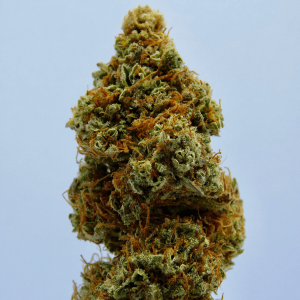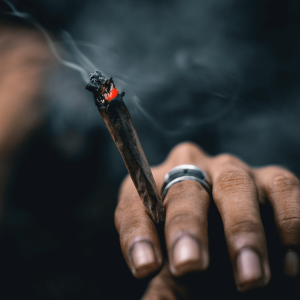Rolling out of bed feeling more leaf than human? You might be experiencing what’s known as a ‘weed hangover.’
While most people’s hangovers might involve a love-hate relationship with Pinot Noir, yours is a dance with Mary Jane — and we’re right there with you.
Now, don’t confuse our topic of discussion today with the standard ‘groggy’ feeling. No, a weed hangover comes with its own unique set of adverse symptoms – think fatigue, upset stomach, mild nausea, brain fog, headaches, and the occasional bout of dry mouth.
In the following blog, we dive into the greens and browns of smoking weed and hangovers, exploring the common signs and the science behind them. So, whether you’re a seasoned smoker or experiencing your very first weed hangover, stick around and let’s hash it out together!
The Science Behind Weed Hangovers
Understanding weed hangovers starts with grasping how Tetrahydrocannabinol (THC), the main psychoactive component of cannabis, interacts with our bodies.
When you consume weed, THC binds to cannabinoid receptors in the brain, giving you that high feeling. How your body metabolizes THC affects how intense and long-lasting the hangover is. Factors like metabolism, frequency of use, and even body fat can inevitably come into play.
Unsurprisingly, dehydration and electrolyte imbalance also contribute to hangover symptoms. Similar to alcohol hangovers, cannabis consumption can lead to dehydration, which in turn amplifies symptoms like dry mouth and headaches.
Meanwhile, an imbalance in your body’s electrolytes can also induce feelings of fatigue and brain fog (and yes, this also applies to an alcohol hangover).
The good news is that these lingering effects are relatively easy to alleviate. Staying hydrated and maintaining a balanced diet can go a long way in reducing the severity of a weed hangover.
Drinking plenty of water and consuming foods rich in electrolytes before, during, and after smoking marijuana (or consuming edibles — we don’t discriminate!) can help maintain your body’s hydration and electrolyte levels, potentially easing hangover symptoms.

Common Symptoms of a Weed Hangover
Weed hangovers can present a variety of symptoms that might feel unfamiliar, particularly if you’re new to the cannabis scene or if you’ve had a bit more than your usual dose. Usually, these symptoms are mild and temporary, but they can still be a nuisance, especially if you’ve got a busy day ahead.
In this section, we’ll break down the common symptoms of a marijuana hangover, so you know what to expect and how to manage them effectively.
Cognitive Effects
- Cognitive Fog and Impaired Memory: One of the telltale signs of a weed hangover is brain fog. It’s like being in a hazy, unfocused state of mind, sometimes with a touch of temporary memory loss. You might struggle to remember things or process new information.
- Impact on Concentration and Alertness: Alongside memory issues, weed hangovers can also impact your concentration and alertness. Tasks that usually come easily might require more mental effort, and you may find your attention span is shorter than usual.
Physical Discomfort
- Headaches and Fatigue: Physical symptoms of a marijuana hangover can include a persistent headache and a sense of fatigue. Despite a good night’s sleep, you might wake up feeling physically drained and sluggish.
- Nausea and Dizziness: Some people also report feeling nauseous or dizzy the morning after heavy cannabis use. These symptoms are typically mild and resolve on their own over the course of the day.
Emotional Impact
- Mood Swings and Irritability: Having a weed hangover can make you feel irritable and prone to mood swings. It might make you more sensitive and reactive emotionally, leaving you feeling a bit on edge.
- Anxiety and Depression: For some individuals, a weed hangover can exacerbate symptoms of anxiety and depression. This might involve feelings of worry, unease, or a general sense of unhappiness. It’s important to monitor these feelings closely, as prolonged or intense emotional distress may warrant a discussion with a healthcare provider.
Duration and Severity of a Weed Hangover
Weed hangovers can vary significantly from person to person, both in duration and severity. The effects can be either short or long-term.
Short-Term vs. Long-Term Effects
Short-term effects typically include symptoms such as fatigue, headaches, and cognitive impairments, which usually subside within 24 hours.
Long-term effects—such as persistent mood changes, ongoing memory issues, or prolonged feelings of fatigue—can last for several days or even weeks.
However, it’s important to note that such long-term effects are relatively rare and usually occur only with heavy, frequent cannabis use.
Duration of Weed Hangovers
Weed hangovers, similar to their alcohol counterparts, usually stick around for a day or less. However, how long they last can differ based on factors such as consumption method (smoke, vape, or edibles), dose, and metabolic rate. For most people, symptoms of marijuana hangovers are strongest when you wake up and gradually fade away as the day goes on.
Factors Influencing Severity
The severity of a marijuana hangover is influenced by several factors, such as:
- The potency of the weed consumed (higher THC content usually results in more intense symptoms)
- Individual’s tolerance level
- State of hydration and nutrition during consumption
- Sleep quality and stress levels
It’s important to note that everyone experiences weed hangovers differently, so severity can vary from person to person.
Prevention and Mitigation of Weed Hangovers
Knowing how to prevent or at least lessen the effects of a weed hangover can make your cannabis experience way more enjoyable. Keep reading for a few strategies to help you achieve that.
Hydration Strategies
Effective hydration before, during, and after cannabis consumption is crucial for avoiding the uncomfortable symptoms of a weed hangover. After all, water is vital for flushing out toxins from your body and maintaining a healthy balance of bodily fluids.
Consuming ample water can help counteract the dehydrating effects of smoking cannabis and limit dry mouth, dizziness, and headaches.
You may also want to opt for electrolyte-rich beverages such as coconut water or sports drinks when consuming weed as they can be beneficial in restoring the electrolyte balance in your body. They can also help to combat the fatigue and brain fog often associated with a weed hangover or drinking alcohol.
Choosing Strains Wisely
Believe it or not, the strain of cannabis you choose can significantly affect your hangover experience or other cannabis-related negative consequences.
For instance, cannabis strains with higher CBD to THC ratios are generally believed to be less likely to cause hangovers. This is because CBD can counteract some of the effects of THC such as anxiety and paranoia, potentially easing hangover symptoms caused by marijuana smoking.
The strain’s phenotype, which includes factors such as terpene profile and cannabinoid concentration, can also influence the hangover. Opting for strains known for their mild effects and lower THC concentration can help prevent unpleasant cannabis hangovers.

Adequate Rest and Nutrition
Rest and nutrition play crucial roles in how your body recovers from a weed hangover. Ensure you get a good night’s sleep after consuming cannabis because adequate rest helps your body to recover and can reduce feelings of fatigue or sluggishness.
Additionally, maintaining a balanced diet can help alleviate some symptoms of a weed hangover. Foods rich in antioxidants and essential vitamins can aid your body in its recovery process, helping to reduce weed hangover symptoms more quickly.
Conclusion
In summary, a weed hangover is a complex and individual phenomenon. It includes cognitive, physical, and emotional withdrawal symptoms that vary in severity and duration.
Factors like weed potency, tolerance, hydration, nutrition, and sleep quality influence the hangover experience. However, most symptoms fade within a full day after smoking, but staying hydrated, choosing strains wisely, and prioritizing rest and nutrition can lessen the impact.
Responsible consumption and awareness are key. Being mindful of your body’s response and intake ensures a better cannabis experience with fewer hangovers. Remember, moderation and informed decision-making are crucial.

Frequently Asked Questions
1. What is a weed hangover slang?
The term “weed hangover” pertains to the aftereffects of consuming cannabis. Symptoms can include fatigue, dizziness, mood swings, irritability, anxiety, and in some cases, depression.
2. What tea is good for weed hangover?
Green tea can be beneficial for a weed hangover. It contains antioxidants and anti-inflammatory properties which can help to alleviate symptoms of a hangover such as headache, mental fog, and fatigue. Also, the natural caffeine in green tea can help counteract feelings of lethargy.
Another excellent choice is ginger tea, especially if you find yourself experiencing adverse effects like nausea or stomach pain after smoking marijuana.

 Rewards
Rewards




